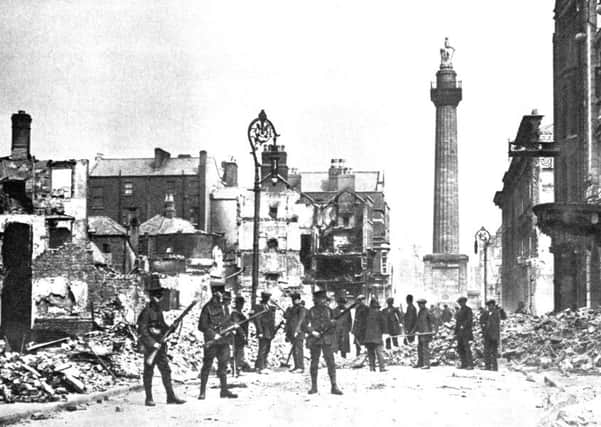Ben Lowry: If you want to celebrate the Rising, fine, but it does underscore Partition


Now it is here.
A lot of things that were predicted or hoped for by the time of this symbolic milestone of Easter 2016 have not in fact happened.
A united Ireland is not even close to being in place.
Sinn Fein is in power in one part of the island, but not in the other. The party did, however, get close to forming part of the government in the Republic. The current paralysis in Dublin is partly due to the fact that the other main parties are not (yet) prepared to share power with SF.
Advertisement
Hide AdAdvertisement
Hide AdTomorrow I will be in one of my favourite cities, Dublin, for the centenary parade. On Monday and on this page next week I will write on what it was like to be there from a pro-Union perspective.
It is clear that the Rising had minimal support at the time, but it is also clear that the British executions were disastrous and ushered in independence once the Great War ended (albeit after an independence war).
But I can think of no situation where the aphorism “damned if you do, damned if you don’t” is more appropriate than the 1916 executions.
It is hard to imagine how Britain could have reacted in any other way to a major rebellion in one of its biggest cities when it was in the middle of a life-or-death struggle for national survival in a catastrophic global war.
Advertisement
Hide AdAdvertisement
Hide AdImagine how weak it would have appeared if it had not executed the key rebels.
But after the executions “all changed, changed utterly” (to somewhat misapply the WB Yeats line).
You could even say that the executions ushered in the end of the British Empire, which was soon over (its biggest possession, India, was gone 31 years later and the other colonies were gone within a half century of 1916).
Ireland was not a colony but regardless of how you classify it, the population in the south and west was suddenly determined to be free from Britain after the executions. It made that clear at the first opportunity, the 1918 general election when Sinn Fein swept aside the moderate nationalists.
Advertisement
Hide AdAdvertisement
Hide AdThere were of course many factors in the rapid demise of the British empire, including two world wars and the fact that local populations rejected such rule (by Britain or France or anyone else). The executions of the Rising leaders were the trigger for a collapse that was going to happen in any event.
Unionists think that the Rising should not have happened but it did. Its legacy is today’s division of the island.
I think unionist politicians should attend the 2016 Rising commemorations, because attendance does not mean approval of the rebellion. You could even argue the opposite: that to be invited as a guest is a sign of the formalised division into two.
The implications of the Rising, independence and Partition were far-reaching, not least the diminished sense of Irishness among northern Protestants.
Advertisement
Hide AdAdvertisement
Hide AdIn 2013 and 14, I serialised the earliest surviving Belfast News Letters, from 1738-39, on their 275th anniversary. There are no references to Northern Ireland in those early papers, for the obvious reason that such an entity would not come into being until almost 200 years later.
But there are barely any references to ‘the north of Ireland’ or to Ulster either.
There are references to the kingdom, but that meant the kingdom of Ireland.
The closer a place was to Belfast, the more likely it was to appear in the then News Letter. But reports from Limerick or Tipperary or Meath or Cork were as common as stories from Fermanagh. There was more from Dublin than Londonderry.
Advertisement
Hide AdAdvertisement
Hide AdNow the border is our subconscious point for where local news ends. Huge events such as the unspeakable Buncrana drownings will always transcend the border, but a minor incident in Armagh might be reported in media outlets including UTV or BBC NI in a way an equivalent incident in Monaghan will not be.
This sense of Northern Ireland being a separate place has increased in recent decades, not decreased.
If people want to celebrate either the Rising (or the 1912 Ulster Covenant) as an unequivocally good thing, so be it. But it means an irreconcilable view of the past.
Thus, however good cross-border relations are (and they are now very good), we remain in effect enemies, albeit enemies now at peace and on friendly terms.
Advertisement
Hide AdAdvertisement
Hide AdThat split is sad, but it is more of a practical problem for those who espouse unity than those who do not.
Ben Lowry (@BenLowry2) is News Letter deputy editor